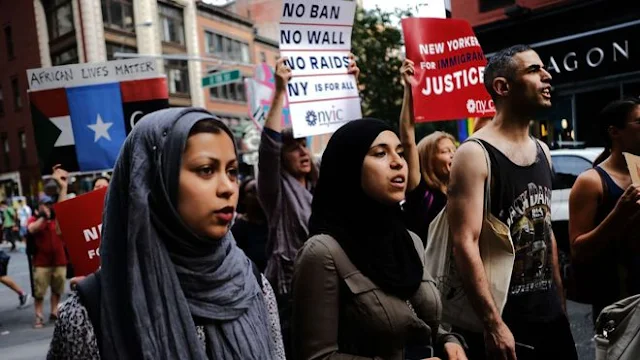This week, Hong Kong marks 20 years since its return from the UK to China but Lai Chun-yin is not celebrating.
He is lying on his back on the pavement, spinning a football in the air. Between his stunt and the iconic Hong Kong harbour skyline stand a handful of mesmerised tourists.
Chun-yin is a 20-year-old coffee shop barista and freestyle footballer, supplementing his earnings by busking his ball skills on the street.
"I don't have much sense of belonging to China," he says. "I love Hong Kong and feel like a Hong Konger. My generation just don't have a good impression of China."
His assessment of the mood among young Hong Kongers was borne out by a survey this month suggesting the number choosing to identify as "broadly Chinese" has declined to new lows in the three years since student democracy protestors occupied the heart of the city during the so-called Umbrella Movement.
Read more about Hong Kong since the handover:
- The Hong Kong handover in a nutshell
- Golden geese and democracy 'infections' - did predictions come true?
- When HK languages get political
- Hong Kong's post-handover generation
- John Simpson: Hong Kong 20 years on
On a warehouse rooftop 21 floors up in a packed district of Kowloon, art student Prince Wong is putting the finishing touches to a wordless statement in graffiti about her sentiments on the 20th anniversary of Hong Kong's return to China.
Instead of painting the Hong Kong flag in its familiar colours of white flower on red background, she is spraying the background black to symbolise mourning.

Only a few hours later, on the eve of President Xi Jinping's visit, Prince was arrested for clambering onto a monument which was the 1997 handover gift from China to Hong Kong.
At 20, Prince is a veteran protester. Her awakening came at the age of 15, watching pupils demonstrate against a patriotic curriculum on Chinese history which the local government tried to introduce in Hong Kong's schools.
Two years later, she was at the heart of the 79-day Umbrella Movement, mounting a week-long hunger strike to demand democracy. Now she runs workshops in schools to politicise the generation coming up behind. But Prince is no longer optimistic about what protest can achieve.
"We still bear the scars of the Umbrella Movement," she says. "We did our utmost and we lost. Before we hoped to move forward, now we're just trying to avoid moving backwards."
Prince is a symptom of the difficulty Mr Xi faces in connecting with Hong Kong's post-handover generation. She suspects his intentions and despises his values.
"If you want people to love your country, it depends on what you do," she explains. "If your country treats your people well, then your citizens will sure love your country, right? We hate the government because they do bad things. We don't hate it for nothing."
Stern patriotism
In my - admittedly limited - experience this week, the only 20-year-olds in Hong Kong who are reliably celebrating Mr Xi's visit and the 20th anniversary of the handover are the mainlanders.
Those who grew up in the Chinese school system are taught from an early age that the loss of Hong Kong in the 1840s was a moment of national humiliation and that taking it back from Britain 150 years later is correspondingly a moment of national pride.
This Hong Kong story is a crucial part of Mr Xi's political message at home, a centrepiece of his "great rejuvenation of the Chinese nation".
Sunny Tan from Hunan Province in central China is enthusiastic. An economics student at Hong Kong University, Sunny has a summer internship at a big Chinese state bank and when we meet in the busy shopping area of Causeway Bay, she is wearing a sober business suit.
In common with Chun-yin and Prince, she is a 20-year old Chinese national living in Hong Kong.
But unlike them she went to school on the Chinese mainland, believes the history she was taught there and is celebrating the 20th anniversary of Hong Kong's handover.
"I see the handover as a sign of an increasingly powerful China," she says. "I am a patriot and I think we should love our country."
"Young people here just want to achieve a high level of democracy at high speed, they want to do it overnight. But they should understand the realities."
Thinking the unthinkable
University campuses are a natural battlefield in this war of ideas. In his office overlooking Hong Kong bay with the hills of mainland China stretching away on the horizon, the vice chancellor of Hong Kong University, Peter Mathieson, tells me that "the three and a half years I've been in post have been among the most tumultuous in Hong Kong's history".
Some of his local students have moved from demanding democracy in the Umbrella Movement three years ago to calling for self-determination or even independence today, claiming that separation from China may be the only way of realising their goals.
Such ideas are anathema to Beijing and, on the mainland, Mr Xi has subjected university campuses to ever stricter political indoctrination, but Peter Mathieson says that however unrealistic independence may be for Hong Kong, university campuses should be places where people are permitted to think the unthinkable.
"I think the calls for independence are a symptom, not a disease," he explains.
"The actual number of my students who really believe in independence is quite small but they're anxious about the future. So people want self-determination, anxious about the alternative - which is greater and greater integration with China."
After a long career in the Hong Kong civil service spanning the decades before and after the handover, Rachel Cartland takes the long view. She first arrived here from Britain 45 years ago at the age of 22, herself fresh from university.
After watching many politicians come and go, and following the twists and turns of Hong Kong's democracy movement, she is hopeful about the values and the talent of some of the young leaders now emerging.
"I think if they can keep their heads, avoid going to prison as far as they possibly can and think about how to appeal not just to the young hotheads like themselves but also to the more mainstream Hong Kongers," she says. "I think Hong Kong could have a pretty bright future."
"Personally I have enormous faith in the people of Hong Kong. I think it will take a very great deal to make them look more like mainland China is today."
Economic pressure
For some young Hong Kongers the vision of a bright future is less about politics than economics. Ann Tsang is 33 years old, single and saving for an apartment.
She and her 30-year-old brother both live with their parents. She says that is completely normal in Hong Kong, but driving discontent.
"You don't eat, you don't go out, you don't have a social life, just to buy a house and you have a mortgage of 30 to 40 years. Basically you live like a slave for your house."
Ann and I are standing on a busy street, staring at the apartments on offer in the window of an estate agent.
A space little bigger than a living room elsewhere in the world costs more than US$1m (£770,000) here.
Hong Kong is now the world's most unequal city after New York. Ann Tsang is not a political protester, but she would like the politicians to tackle the housing crisis.
'We push back'
"Youngsters get really agitated and frustrated. They don't know what their future is," says local writer Jason Ng.
On a hot Hong Kong tram rattling through this densely packed human hive, he remarks that this is not the tour the Chinese president will get.
"He will be taken on a North Korean-style highly controlled tour where he will only see the best side of Hong Kong. He will not see pain and suffering or protesters."
Jason Ng argues that this lack of connection with ordinary people has caused Chinese leaders to misdiagnose the problem in their relationship with Hong Kong.
"As far as Beijing is concerned the root cause of a lot of the ungovernability of Hong Kong is because young people don't have the sense that they are part of China. And the best way to get at that is to inculcate an idea of patriotism at an early age. To Beijing that is the ultimate solution. But you can't force people to love you."
The writer says if by some miracle he got a chance to speak to the Chinese president during the celebrations to mark the 20th anniversary of the handover, his message would be blunt.
"If you want to govern Hong Kong there's one very simple answer. Leave us alone. That's all we want. We are not interested in ending one-party rule in China. We just want our way of life. So de-escalate. Don't push us because when you push us, we push back."
BBC NEWS














